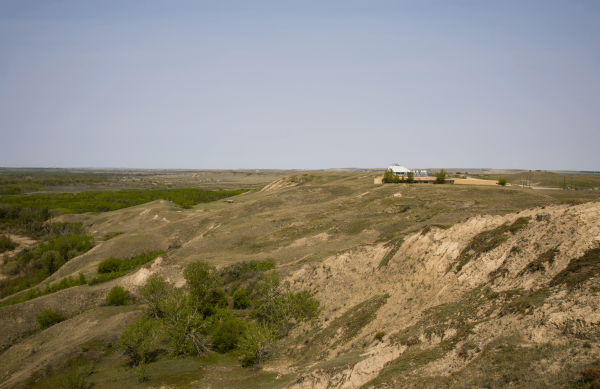
Film screening and discussion to highlight Treaty history in Canada
By Julianna Keskic, September 14 2024—
On Sept. 18, the Office of Indigenous Engagement is hosting a film discussion event in ENG SSE 207 from 10 a.m. to 12 p.m. Attendees will be watching episode six of the series Treaty Road, a six part docu-series that follows two Canadians on their journey to uncover the truth about the signing of the Numbered Treaties, and ultimately themselves.
In an interview with the Gauntlet, Gerald Ratt, the Indigenous intercultural initiative specialist at the Office of Indigenous Engagement, discussed how he developed this event as a way to connect people with reconciliation as we approach Sep. 30, the National Day for Truth and Reconciliation.
“I came across Treaty Road on Aboriginal Peoples Television Network and I thought that it would be a great opportunity to create space for dialogue, discussion, reflection and learning on Treaty 7,” Ratt stated “I think it’s really important that Canadians understand what their roles and responsibilities are to Treaty.”
Each film is about 45 minutes, and after each film attendees will be unpacking each film through dialogue — facilitated and moderated by the staff at the Office of Indigenous Engagement.
Emphasizing the importance of fully understanding Indigenous relations, Ratt highlighted the significant footprint that Treaty has on where and how we live today.
“Treaties are a foundational part of Canada and Canadian society. Every road, house, building, or business that exists today in a treaty area was made possible because of the treaty. I want people, students, staff, faculty and leadership to reflect on these important words, we are all treaty people, and to find meaning and understanding through dialogue after each film,” Ratt explained
This episode viewing event is a way to engage in Truth and Reconciliation and gain a better understanding of Treaty and the relationship between Indigenous peoples of Canada and settler peoples.
The Office of Indigenous Engagement formed in 2017. Through multiple phases of dialogue with the Indigenous community the goal and mandate of this office was decided. Ratt spoke to the creation of this space by outlining the steps that led to today.
“I also wanted to just talk about the Office of Indigenous Engagement and ii’ taa’poh’to’p. ii’ taa’poh’to’pis our Indigenous strategy, and we have a role to support and guide the University of Calgary on its path of transformation and communicate its commitment and responsibility to truth and reconciliation.” Ratt explained
Ratt emphasized the importance of learning about Treaty and coming together — in events like the upcoming film discussion events — to share knowledge and community.
“It’s really critical to come together to hold space. We call it shared space, we call it ethical space, where there are multiple worldviews coming together. Because there’s more than one story to treaty,” Ratt said.
Ratt explained that an important piece in creating healthy relationships is building a foundation of understanding, awareness and sensitivity.
“It is crucial to build these relationships with all people, through engagement, so that we can move forward together and make an impact on what reconciliation is going to look like 10 years from now,” Ratt said.
For more information on the We Are All Treaty People: Treaty Road Series visit the website. To register for the film viewing event on Sept. 18 visit their website.
